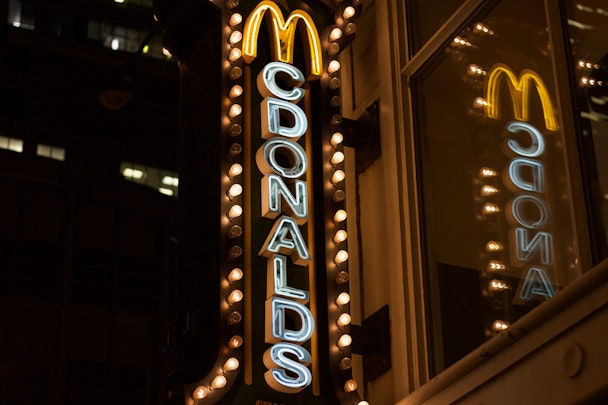Gamification and brand loyalty: 5 brands winning the battle for consumer attention
As budgets squeeze, the competition for customers only grows. For The Drum’s retail deep dive, No Brainer’s Lee Cullen looks at 5 brands using gamified loyalty programs to give them the edge.

McDonald's, Sainsbury's, Sky and others: masters of gamified retail loyalty? / Joshua Austin via Unsplash
The term ‘gamification’ has been thrown around for years. Its meaning continues to evolve in line with new advances and technological innovations. Now, it’s usually used for digital work, but physical gamification is alive and well, too.
QR codes, augmented reality, and quiz-style questions are just some of the tactics used to inject fun into brand campaigns. The key objective of gamification is usually engagement, leading to other desired outcomes like sales, brand loyalty, and customer retention. When deployed right, it can be a brilliant tool to foster deeper relationships with a target market.
There’s a huge amount of psychology and behavioral science that sits behind the best gamification work.
For example, we’re in the middle of a cost-of-living crisis, so for lots of people, price is the number-one decision-making factor. Brands must tap into the primary motivations of their target market and find ways to align with them, be part of their lives, and reward people for staying loyal even when times are tough financially.
Understanding what really motivates your core demographic is the crucial factor. Here are five brands using gamification and loyalty to boost market share.
Advertisement
1. Sky
British broadcaster Sky officially announced the launch of its own loyalty scheme back in 2015, rewarding customers depending on how long they've been with the brand by placing them into certain ‘tiers’. With a ‘VIP’ section of the MySky app, a range of prizes (free movies; chocolate; tickets to football matches) and experiences can be won. Those with the most years of loyalty get extra entries into the competitions.
It's a psychological masterclass amid competition from the likes of BT, Virgin, and Netflix, making customers feel really good about their loyalty and, perhaps more importantly, making them think twice about ever wanting to leave. Sky holds a market share of around 30% in the UK, so it’s clearly working.
2. Morrisons
The UK’s fourth-biggest supermarket by turnover, Morrisons, scrapped its popular ‘Morrisons Fivers’ perk in 2021, attempting to replace it with a more personalized approach through ‘My Morrisons’. The move was met with public backlash; fast forward to 2023 and the supermarket has done a full 180 and brought back the Morrisons Fiver, albeit in a slightly different guise. Only selected products now count towards the £5 voucher, but customers who like to shop in-store will again pick up a physical voucher when they hit a certain number of points, which for many feels like getting free cash.
Advertisement
3. Sainsbury’s
Another notable mention in the supermarket aisle goes to another supermarket, Sainsbury’s, for its ‘Great fruit & veg challenge’ which returned this year. The campaign uses fun, interactive targets in-store to encourage shoppers to buy and eat more fruit and veg. It’s run via the brand’s Nectar app and the points can be exchanged for cash and spent in Sainsbury’s, or sibling retailers Argos and Habitat.
This campaign promotes a healthy eating message, aligning with Sainsbury’s brand values (“living healthier lives”). It was reported that last year’s challenge saw 580,000 customers take part and 88m portions of fruit and vegetables purchased in a seven-week period.
4. Temu
Chinese retailer Temu exploded into UK’s in 2023, with Google Trends data showing more than 650,000 searches for the term ‘Temu’ in October (compared with less than 7,000 per month earlier this year).
The online marketplace offers a huge variety of goods, shipped directly from Chinese factories and warehouses. Products now rank highly in Google searches, and are being heavily re-marketed to consumers across other channels.
The price point of Temu products is one driving factor behind the brand's success, with some heavy discounts that even the likes of Amazon and Ebay struggle to compete with. But Temu also uses clever gamification to encourage basket checkouts. Counters showing how many products are left and timers on price reductions and spinning wheels offering ‘exclusive’ discounts are just some of the tactics being used to entice shoppers to bag a bargain as quickly as possible.
There’s a strong argument that the gamification on show can make it all feel a bit gimmicky, but it's easy to see why so many shoppers have been hooked during a cost-of-living crisis.
Suggested newsletters for you
5. McDonald’s Monopoly
First introduced back in 2005, this is an example of gamification that has really stood the test of time. For a select period of the year (September to October in 2023), fans of the Golden Arches are encouraged to buy McDonald’s products for the chance to win prizes ranging from free food to £100,000 in cash.
Customers collect game tokens and match up the colors from the famous Monopoly board, with a select amount of Gold Cards up for grabs (Willy Wonka-style). The whole concept is integrated into the McDonald’s app, where players can bank codes and get an extra ‘peel’. The campaign this year has driven waves of positive media coverage and continues to help McDonald’s sit firmly at the forefront of its target customers’ minds.
Looking ahead to 2024
Gamification continues to play an important role in brand engagement. Expect that continue into next year and beyond. Brands will be pushing loyalty campaigns harder than ever next year as the battle for consumer attention, spend, and loyalty rages on.
Get ready for the retail world of the future with more smart thinking and detailed analysis over at our dedicated deep dive hub.
Content by The Drum Network member:

No Brainer
We're an award-winning Digital PR, SEO and Content agency that delivers data-led and results-driven creative campaigns which really work.
Find out more
